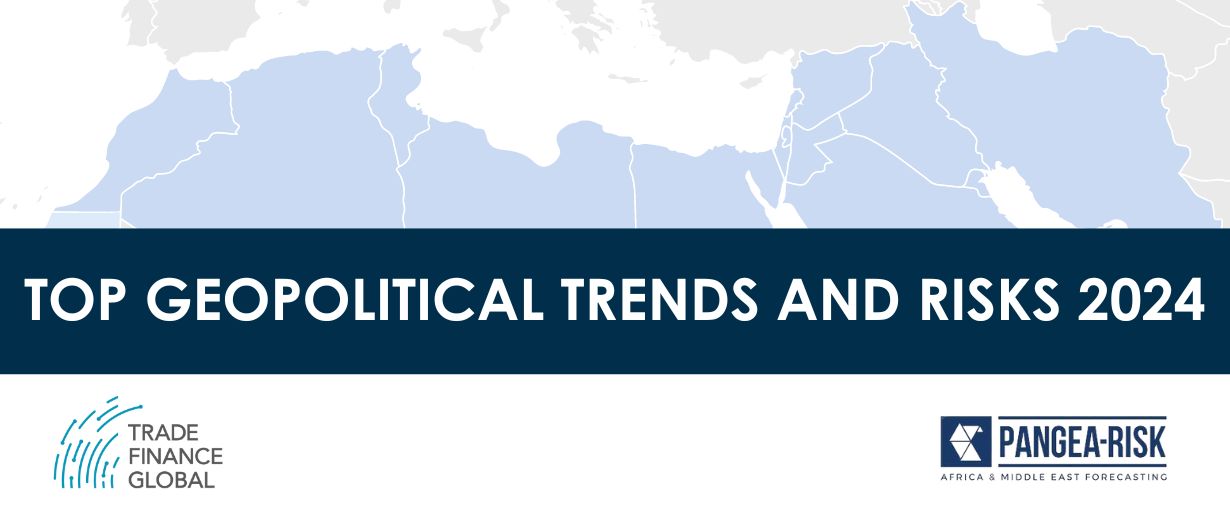Estimated reading time: 3 minutes
What are the top political, security, and economic trends and risks shaping Africa and the Middle East in 2024?
This research and analysis is provided by PANGEA-RISK and distributed in partnership with Trade Finance Global.
African sovereign debt: Stepping back from the edge
At the beginning of 2024, the outlook for African sovereign debt sustainability substantially improved, evidenced by the re-entry of several African issuers to the international bonds market. Pangea-Risk’s previous white paper on this subject, released in February 2023, suggested that numerous African sovereigns, grappling with debt sustainability issues, would have successfully restructured their most burdensome loans, thus steering these nations towards enhanced debt sustainability. After a year marked by challenges in debt issuance, especially for frontier market participants, certain African sovereign borrowers took this chance to engage with investors outside of deal-making contexts, providing updates on their financial standings.
This approach of open and transparent communication has enabled some issuers to make a comeback to the market in 2024, with others, including potentially Angola and Nigeria, preparing to follow suit in the upcoming months. Driven by this positive trend, many African sovereigns are emerging from the so-called “African debt crisis” and are re-establishing themselves as trustworthy borrowers, simultaneously reinforcing their status as dependable partners for trade and investment. In this 2024 white paper, Acre Impact Capital and Pangea-Risk evaluate the prospects for African sovereign debt sustainability and pinpoint fresh opportunities for trade and investment.
The white paper was authored by PANGEA-RISK and Acre Impact Capital.
Senegal’s new political leadership to face economic challenges
Senegal stands at a pivotal juncture in its political history, with the election of Bassirou Diomaye Faye as the new President, a development that has stirred both hope and apprehension among various stakeholders.
Faye, a former tax inspector and transparency activist, alongside his political mentor, Ousmane Sonko, represents a fresh but inexperienced leadership duo poised to navigate the complex waters of Senegal’s economic and political landscape.
Massive UAE investment into Egypt bolsters forex reserves and catalyses enlarged IMF deal
In February 2024, Egypt secured a monumental investment deal with an Emirati sovereign wealth fund, amounting to $35 billion. This substantial agreement, centred on the ambitious development of Ras El Hekma city, marks a significant milestone in Egypt’s efforts to fortify its economic foundations.
While the investment is expected to enhance Egypt’s foreign exchange reserves and provide a much-needed impetus to the country’s economy, it also brings into focus the pressing need for comprehensive structural reforms to ensure long-term sustainability and growth.
Pangea-Risk launches climate insights
Maritime Insights: US-led airstrikes will not curb Houthi threat in Red Sea
The escalation in the Red Sea, marked by US-led airstrikes against Houthi forces in Yemen, highlights the complexities of maintaining maritime security in this vital region. Despite the strategic targeting of more than 60 Houthi positions by the United States and its allies, the impact on curtailing Houthi maritime aggression appears limited.
Africa in 2024: Identifying major country risk trends, opportunities and hotspots
Africa in 2024 stands at the crossroads of unprecedented economic growth and daunting challenges. As the continent positions itself as a pivotal player in global economic expansion, it grapples with enduring vulnerabilities to climate change, food insecurity, foreign exchange shortages, and political instability.
The dichotomy of Africa’s trajectory is marked by its potential to drive trade and investment, juxtaposed against the backdrop of regional conflicts and debt vulnerabilities that may be exacerbated in the coming year.
 Australia
Australia Hong Kong
Hong Kong Japan
Japan Singapore
Singapore United Arab Emirates
United Arab Emirates United States
United States France
France Germany
Germany Ireland
Ireland Netherlands
Netherlands United Kingdom
United Kingdom






Comments are closed.